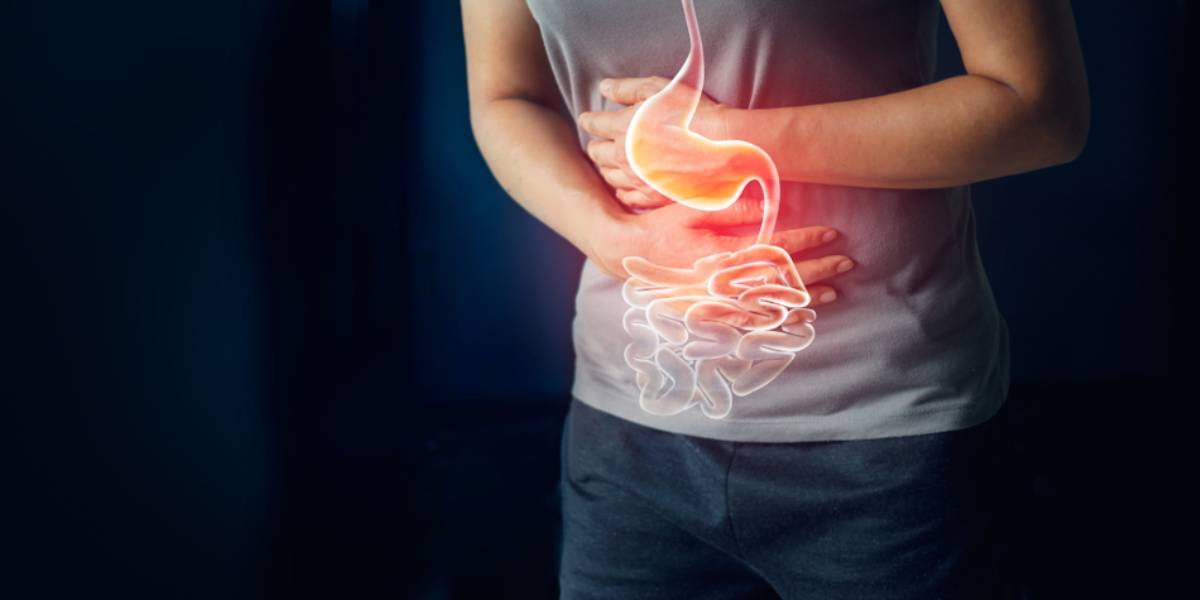“Those who had stomach or bowel symptoms when they had Covid 19 were more likely to continue experiencing these issues later on,” the study noted.

The prevalence of gastrointestinal symptoms after Covid varies depending on the study and the timeframe considered. (Shutterstock)
The research on the long-term effects of Covid over the past two years has conclusively demonstrated its association with respiratory illness and cardiovascular disease. However, recent findings have added a new dimension to our understanding: Covid can also manifest with lingering gastrointestinal symptoms.
A study published in the Journal of Gastroenterology and Hepatology revealed that individuals who had contracted Covid were more prone to experiencing stomach and bowel issues, such as irritable bowel syndrome (characterised by abdominal pain, cramping, bloating, gas, diarrhoea, and constipation) or dyspeptic symptoms (discomfort or pain in the upper abdomen, often accompanied by bloating, belching, and nausea), especially in the first three months post-infection.
Surprisingly, these issues persisted even after six months, setting Covid survivors apart from those who had not been infected.
The study, titled Post-infection functional gastrointestinal disorders following coronavirus disease-19: A case–control study, underscores that individuals with symptomatic Covid were at a higher risk of developing gastrointestinal problems compared to asymptomatic individuals.
“Those who had stomach or bowel symptoms when they had Covid 19 were more likely to continue experiencing these issues later on,” the study noted.
They also found that other factors that increased the risk of stomach and bowel issues following Covid included loss of smell or taste, mental health issues, and the presence of stomach problems during the early period after recovering from Covid.
Speaking to South First, Dr K Bhandari, Consultant Gastroenterologist, Hepatologist, and Interventional Endoscopist at Star Hospital Secunderabad, emphasised, “People experienced Covid-related gastrointestinal symptoms, including diarrhoea, vomiting, and abdominal pain, which are observed in one out of five infected individuals. After recovering from Covid, some people may face prolonged systemic symptoms or even develop new ones, often referred to as ‘long Covid’ or ‘post-acute Covid 19 syndrome’. Individuals affected by Covid exhibited a significantly higher incidence of either new-onset or prolonged symptoms of functional gastrointestinal disorders compared to healthy individual.”
The study aimed to evaluate the frequency and spectrum of post-infection functional gastrointestinal disorders (FGIDs) among Covid patients and historical healthy controls, as well as the risk factors for their development.
280 patients with Covid and 264 historical healthy controls were followed up at one and three months using translated and validated Rome IV Diagnostic Questionnaires for the development of chronic bowel dysfunction (CBD), dyspeptic symptoms and their overlap, and at six months for IBS, uninvestigated dyspepsia (UD) and their overlap.
In simpler terms:
“It is believed that the virus may prompt changes in gut-brain signalling, leading to conditions like IBS. Additionally, the presence of virus particles in the oesophagus, stomach, small intestines, and colon can trigger abdominal pain and diarrhoea, which may persist even after recovery from the acute phase of the illness. Post-infectious IBS can also occur following viral infections, and the SARS-CoV-2 virus is now appreciated as an enteric pathogen, further contributing to gastrointestinal symptoms,” said Dr Bhandari.
According to the study, the development of FGIDs after recovering from Covid could be influenced by various factors. Similar mechanisms have been observed in the development of post-infectious irritable bowel syndrome (PI-IBS) after acute gastroenteritis.
The study said that the development of PI-IBS can be influenced by factors related to the infecting agent (like specific pathogens), the host (including genetic makeup and immune response), and the interaction between the agent and the host.
Certain pathogens, especially invasive ones like Shigella dysenteriae, Campylobacter jejuni, and Giardia lamblia, are more likely to lead to PI-IBS compared to viruses.
The host’s (patients) genetic makeup and the degree of the body’s immune response, particularly the T regulatory response, plays a role in the development of PI-IBS.
“Altered conditions in the intestines, such as imbalances in gut microbiota, changes in mucosal serotonin levels, abnormalities in bile acids, and inflammation of the mucosa are known factors in the general development of IBS. Some of these factors have also been observed in patients recovering from Covid,” the study noted.
Comparisons between dyspeptic symptoms and CBD reveal that initial symptoms may be non-specific, resolving over time, while later lower GI symptoms indicative of CBD and IBS persist, suggesting a more specific pathology linked to extended mucosal inflammation.
Moreover, the study identifies associations between the development of post-Covid FGIDs and symptoms like anosmia, ageusia, and psychological comorbidity during the initial Covid episode, hinting at a connection between peripheral and central nervous system involvement in the pathogenesis.
The involvement of the nervous system, including autonomic dysfunction persisting post-recovery, emphasises the need for further mechanistic studies to comprehensively understand the development of FGIDs following Covid.
The prevalence of gastrointestinal symptoms after Covid varies depending on the study and the time frame considered. Some key findings include:
These studies all suggest that gastrointestinal symptoms are relatively common after Covid, with a range of prevalence rates depending on the specific population and time frame considered.

Jul 26, 2024

Jul 26, 2024

Jul 26, 2024

Jul 26, 2024

Jul 26, 2024

Jul 26, 2024